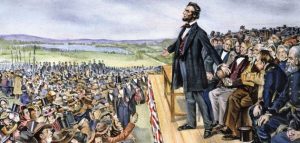John 5.19-29

Mathew’s gospel records the Pharisees accusing Jesus of performing his miracles by the power of the devil. (Mathew 12.22-32) It was at the same time one of the most ridiculous accusations as well as one of the most heinous. A man had been brought to Jesus who was demon possessed, blind and unable to speak. Jesus heals him to the extent that he could both see and talk Matt 12.22 which naturally caused amazement in all those who saw it and knew the man in question. Jesus puts down the Pharisee’s accusation with the now famous statement, ‘Every kingdom divided against itself will be ruined, and every city or household divided against itself will not stand.’ Matt 12.25 Abraham Lincolns “House divided” speech (1858 on his acceptance of his nomination to the Senate when the nation was profoundly divided over slavery) did not prevent, drawing on this biblical principle, but it did provide the basis for unity following the civil war. In modern times we saw the echo of this in the Peace and Reconciliation process following the abandonment of apartheid in South Africa, led by Bishop Desmond Tutu and Nelson Mandela.
In the passage in John’s gospel we have Jesus explaining that his authority comes from God the Father in obedience to him. In doing so he is also claiming equality with God the Father. Jesus is demonstrating the unity of the Godhead. Each has their role. How is this equal partnership worked out?
Jesus, the Son, does what he sees his Father doing demonstrating his divine insight. He limits his own actions to those of his Father’s will. John 5.19 We see Jesus aligning himself to the will of the Father in all he does and in this way he reveals the invisible God to us. God the Father reciprocates by showing all he is doing to the Son. John5.20 The basis of this reciprocal relationship is equal love. The relationships within the Godhead are demonstrations of how our relationships with God himself, between members of his church and especially in marriage should be ones of unity and love.
Jesus obedience will lead on to the demonstration of greater works than the disciples and the general public including the Jewish leaders had yet seen. This includes the raising of the dead that demonstrate that the Son is the life giver. John 5.21 Later Jesus raises from the dead Jairus’ daughter, the son of a widow in Nain and his close friend Lazarus. These of course lived to die again but Jesus’ true divinity and proof he has authority over eternal life is shown by his own resurrection from the dead. The raising of the dead is achievable by God alone.
A second feature of divinity is the right to render final judgement. Here Jesus reveals that the Father has ‘given all judgement to the Son, that all may honour the Son, just as they honour the Father.’ John 5.23 Jesus here is claiming the same honour as the Father meaning he is worthy of the same praise.
The third God defining feature is the authority to raise the dead on the final day and execute judgement. John 5.27 He is able to do this because as God the Father has life within himself and so does the Son. John 5,26 Jesus is able to grant eternal life to those who have believed in him. John 5.24 ‘Truly, truly, I say to you, an hour is coming, and is now here, when the dead will hear, the voice of the Son of God, and those who hear will live. The NIV Study bible explains it in this way. “Hears, includes believing and obeying. ‘My word’ brings either eternal life and cleansing or judgement. Because the Son, in all he says and does, mediates the Father to us placing one’s faith in the Son is placing it in the Father.”
We see in this passage the closest unity between the Father and the Son. This unity is worked out throughout the gospel until it is tested without being broken, to the greatest degree in the Garden of Gethsemene.
Jesus showed the way the people treated him showed how they really treated God the Father. How do we treat Jesus?
Rend Collective – Church Online (Be warned it is a 20 minutes collection
